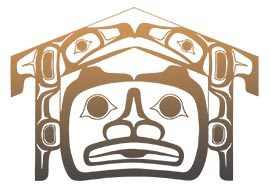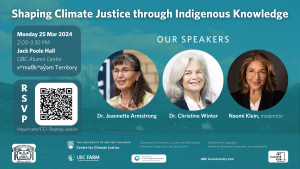About:
The UBC Centre for Climate Justice will host a dialogue between Jeannette Armstrong and Christine Winter on Monday, March 25 from 2:00 PM – 3:30 PM to discuss how Indigenous knowledge shapes climate justice. The event will begin with presentations by each speaker and will be followed by a discussion, moderated by Naomi Klein. The talk will take place at Jack Poole Hall in the UBC Alumni Centre.
Link to Event: https://climatejustice.ubc.ca/events/event/shaping-climate-justice-through-indigenous-knowledge/ (RSVP on the event website)
Speakers:
Dr. Jeannette Armstrong is Syilx Okanagan, a fluent speaker and teacher of the Nsyilxcn Okanagan language and a traditional knowledge keeper of the Okanagan Nation. She is a founder of En’owkin, the Okanagan Nsyilxcn language and knowledge institution of higher learning of the Syilx Okanagan Nation. She currently is Associate Professor and Canada Research Chair in Indigenous Okanagan Philosophy at UBC Okanagan. She has a Ph.D. in Environmental Ethics and Syilx Indigenous Literatures. She is the recipient of the Eco Trust Buffett Award for Indigenous Leadership and in 2016 the BC George Woodcock Lifetime Achievement Award. She is an author whose published works include poetry, prose and children’s literary titles and academic writing on a wide variety of Indigenous issues. She currently serves on Canada’s Traditional Knowledge Subcommittee of the Committee on the Status of Endangered Wildlife in Canada.
“We perhaps all know that what is required is a profoundly different ethic to attend to the full scale of climate justice to diagnose, assess and problem-solve climate change opportunities. Such approaches already exist in the lives, experiences and knowledge of our peoples who have been seeing these changes and dealing with them for a long time. Climate Justice demands that frontline communities most vulnerable to the effects of climate change be fully engaged in solution making however difficult that shift be in policy and action making.” -Dr. Jeannette Armstrong, Armstrong & Klein: Syilx-led Climate Justice in a Global Context, 2013
Dr. Christine Winter is Senior Lecturer in environmental, climate change, multispecies and indigenous politics at the University of Otago. Her research focuses on the ways in which political theory, and particularly theories of justice, continue to perpetuate injustice for some Peoples (and more specifically for Māori) and the environment. She developed a decolonial critique of intergenerational justice in The Subjects of Intergenerational Justice: Indigenous philosophy, the environment, and relationships (2022 Routledge). She is currently engaged with decolonial framings for the political theories of multispecies, environmental, climate and planetary justice, the planetary boundaries.
“…human induced environmental disasters (disasters) are an inevitable outcome of western political philosophy and that laws, regulations and conventions based in that philosophy are unable to adequately forestall nor respond to them. It is a systemic dynamic that is incompatible with eco-systems based precaution and with thinking compatible with intergenerational environmental justice.” -Dr. Christine Winter, Disaster? No Surprise, 2022
Naomi Klein is Director of Public Engagement at the Centre for Climate Justice and Associate Professor of Geography at the University of British Columbia. Her research and teaching take place at the intersection of crisis and political transformation. At UBC, she focuses on how the climate emergency can and must act as a catalyst for bold, justice-based transformation in our bioregion and beyond, with particular attention to the intersections between climate justice and Indigenous land rights; the gendered and racialized labour of care; and the rights of migrants. Prior to joining UBC, she was the inaugural Gloria Steinem Endowed Chair in Media, Culture and Feminist Studies at Rutgers University, and she co-founded The Leap.
“It seems to me that our problem has a lot less to do with the mechanics of solar power than the politics of human power—specifically whether there can be a shift in who wields it, a shift away from corporations and toward communities, which in turn depends on whether or not the great many people who are getting a rotten deal under our current system can build a determined and diverse enough social force to change the balance of power.” -Naomi Klein, This Changes Everything: Capitalism vs. The Climate, 2014
Learn More:
If you are interested in learning more about any of the speakers, their work, or how Indigenous perspectives are or can be integrated into climate justice advocacy and policy making, check out some of the resources below for more information.
UBC Library’s Research Guide on Indigenous perspectives on climate change, created by staff at Xwi7xwa Library: Indigenous Perspectives – Climate Change – Research Guides at University of British Columbia (ubc.ca)
In December of 2023, Dr. Jeanette Armstrong and Naomi Klein’s led a discussion on how climate justice addresses how climate crises disproportionately impact communities already dealing with the effects of colonialism, capitalism, and other intersecting structures of power. To read more about the talk and access the transcript here: Armstrong & Klein: Syilx-led Climate Justice in a Global Context – Centre for Climate Justice (ubc.ca).
Disaster? No surprise, Environmental Politics, on how we can contextualize environmental and intergenerational justice within the framework of economic maximalization and western political philosophy. Dr. Winter’s book, The Subjects of Intergenerational Justice: Indigenous philosophy, the environment, and relationships challenges western intergenerational environmental justice for its lack of consideration of Indigenous philosophies and perspectives on environmental problems.
Naomi Klein’s book, This Changes Everything: Capitalism vs. The Climate, on how we cannot address climate change without addressing the failed economic system it is tied to, is available to read through UBC Library.

